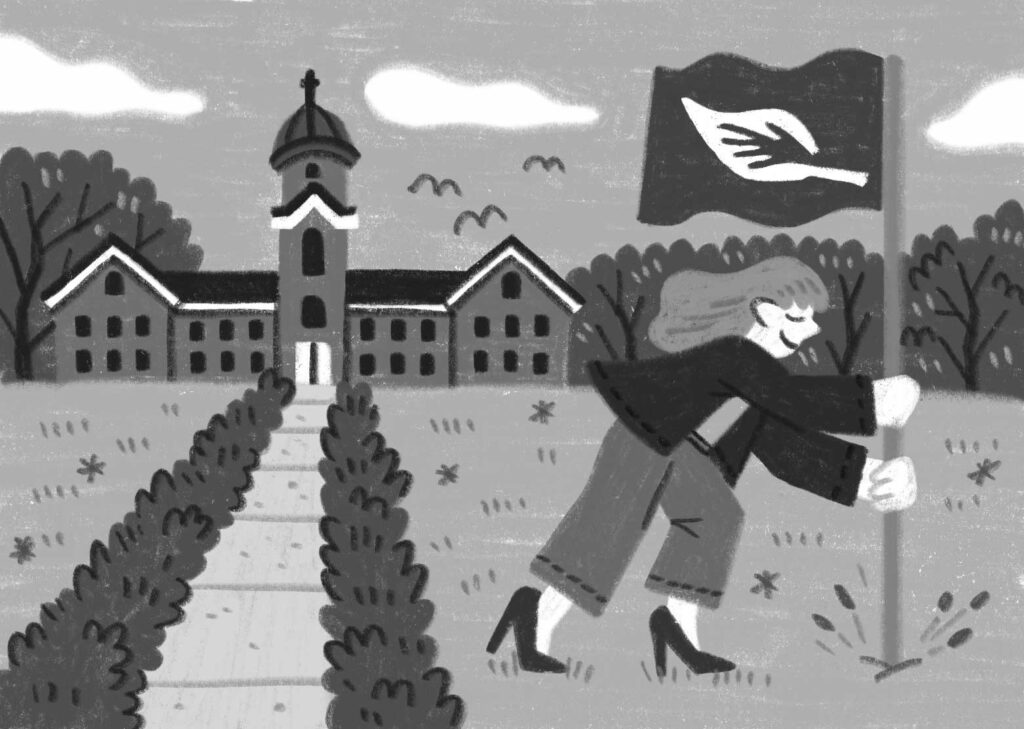On October 18, 2023, the Nova Scotia Co-operative Council celebrated its seventy-fifth anniversary with a glittery gala and public talk with the former first lady and celebrity author Michelle Obama, before a packed house in Halifax’s Scotiabank Centre. It was actually the second of two such extravaganzas, coming four years after an equally flashy evening billed as “A Conversation with Barack Obama.” Shelling out speaker fees to New York booking agencies for celebrities commanding $200,000 (U.S.) or more per appearance was now, apparently, aligned with the mission of a council representing community credit unions and small producers in rural and small-town Nova Scotia.
At centre stage with Michelle Obama that night was the bold and brassy chief executive officer Dianne Kelderman, who presides over an organization that lays claim to the heritage of the Antigonish Movement, founded a hundred years ago by two Catholic visionaries and dedicated to serving the poor in Cape Breton and other parts of eastern Nova Scotia. Putting on airs was the last thing those humble founders would have imagined.
Finding the connections between then and now, spinning a new narrative, and closing the credibility gap were the challenges facing one of Atlantic Canada’s best-known writers and opinion columnists, Alec Bruce, whom Kelderman commissioned to write what amounts to an official history of her organization. While The Cooperators purports to be “a work of creative non-fiction,” it is actually a thinly veiled attempt to put a shine on the public reputation of a sizable entity funded by the province’s cooperative sector.

Today’s chief executive officer, Dianne Kelderman, has laid claim to a rich history.
Alexander MacAskill
Business writers are often quite good at turning out hagiography that deifies industry heroes, and it’s a real credit to the creative talents of Bruce, the son of the journalism legend Harry Bruce, that The Cooperators is an entertaining read, full of fascinating anecdotes that help fill in the blanks of what happened to the movement from 1949 onward. Cleaning up the book’s peculiarly irregular endnotes and providing an index would have enhanced the value of his accessible history.
Today’s Nova Scotia Co-operative Council, headed by Kelderman and based in Truro, would be barely recognizable to those behind the original Antigonish Movement. Its spiritual founder, Jimmy Tompkins, sought to mobilize and educate impoverished fishermen on the rocky shores of Canso —“perched at the literal end of civilization”— by instilling in them the gospel of self-help and the necessary resilience to survive the Great Depression. He was joined by his cousin Moses Michael Coady, a tireless and restive priest, who stood six foot four but was known as Little Mosie. It was Coady who formalized the movement at its original base, the Extension Department of St. Francis Xavier University.
Initially, the Antigonish Movement focused almost exclusively on adult education, on revitalizing fishing, farming, and mining communities, and on saving souls from a godless life — all undertaken from the bottom up, not the top down. Over time, provincial and regional cooperative organizations consolidated and grew bigger, shedding former commitments to fighting rural poverty and illiteracy and to reforming society at the grassroots level. This book merely confirms that the Nova Scotia Co-operative Council has largely ceded social assistance efforts to expanded public service agencies and adult education work to the Coady International Institute, founded in 1959.
Character and circumstance are what animate Bruce’s narrative, but true believers in the Antigonish Movement’s mission to uplift rural society will find it odd that Father Jimmy, as he was known, is barely acknowledged and that Coady is given relatively short shrift. It is especially startling to see Coady depicted in his waning years as bitter and disillusioned, and it’s sad to read of the frustrations welling up on his deathbed in 1959, at St. Martha’s Hospital in Antigonish. More sympathetic observers, such as Alexander F. Laidlaw, who edited The Man from Margaree: Writings and Speeches of M. M. Coady, from 1971, described a different tragedy unfolding in the late 1950s. Confronted by a world dominated by modernism, controlled by distant corporate institutions, and seized with anti-Communism, Coady saw “too many of his dire warnings” coming to pass, Laidlaw wrote, and “too many of his dreams for mankind” far from realized.
It’s clear from reading The Cooperators that the heirs to the Antigonish Movement are uncomfortable with their own history. From the beginning, it was imbued with “a certain missionary quality,” Bruce concedes, but the book generally downplays that ongoing connection. Drawing upon a 2015 retrospective written by the St. Francis Xavier professor Dan MacInnes and published by the online British platform openDemocracy, Bruce attempts to secularize the council’s origins. “When speaking of aspirations, it’s misleading to label [these] efforts as ‘Catholic,’ ” Bruce slightly misquotes MacInnes, because Coady challenged those who were “pompous” and was uneasy about the “undue deference” that was accorded the clergy.
Scholars and students of the Antigonish Movement will be dismayed to see that the deep insights and penetrating analysis of the founders’ biographers — the Halifax author Jim Lotz and the former Mount Saint Vincent University professor Michael Welton — are limited to passing references. Bruce could have mined Lotz and Welton’s Father Jimmy: Life and Times of Jimmy Tompkins, from 1997, and Welton’s Little Mosie from the Margaree: A Biography of Moses Michael Coady, from 2001, more effectively to ground his book in the tradition of Catholic reformism and community development.
Bruce does document the cycle of decline in small-scale community development. With the death of its founding visionaries, the movement lost its direction and was overshadowed by two powerful forces: the expansion of the postwar social security state and the rise of consolidated co‑ops. Between 1950 and 1960, fishing cooperatives in places like Isle Madam, Grand Étang, Cheticamp, and Port Bickerton merged to create what Bruce aptly describes as “consolidated powerhouses,” which imperilled “formerly robust ‘unmerged’ ones,” such as Tor Bay, Northumberland, and Capeview. Agricultural co‑ops also stumbled, and one such organization, Eastern Co-operative Services, collapsed in 1965, ending what Coady’s contemporary Reverend Michael Gillis described as a “furtive, panicky attempt to build something to show for [a] twenty-five-year effort in agriculture.” The Nova Scotia Co-operative Union itself went into decline in the 1970s — becoming, “essentially, a bookkeeping service”— and was reorganized as the Nova Scotia Co-operative Council in 1986. “But right through the 1990s,” Bruce writes, “the Council routinely wondered what it was supposed to do. Who was it anymore?”
As Bruce tells it, a saviour eventually emerged out of the disarray and confusion: the supremely confident businesswoman Dianne Kelderman. Born in 1968 in St. John’s, the eldest of six children in a struggling family, Kelderman took over the floundering council in 1999, when it had just $900 in assets. With a string of degrees after her name, Kelderman had honed her leadership and networking abilities while heading the Atlantic Co-operative CED Institute — or Atlantic Economics — in Halifax.
The council has since become Kelderman’s baby. Using her political smarts and Progressive Conservative connections, she has forged partnerships and built an economic dynamo with over $240 million of investment capital under management. In 2012, Atlantic Business Magazine described Kelderman as a “Type A who thrills to take on more than anyone thinks she can handle, and who actually enjoys burning the candle at both ends.” By 2018, according to that year’s annual report, the organization’s mission had morphed into one where “we imagine plausible new ways that we can make the lives of individuals better, businesses stronger and our communities more prosperous.”
A great deal of The Cooperators focuses on Kelderman’s heroics. While noting that she does not like to talk about herself, Bruce recounts, in some detail, numerous examples of her dynamic and driven leadership, including when she united a group of agitated pooh‑bahs in 2003 with the help of John Hamm, the friendly Progressive Conservative premier. “She was completely confident telling him, or anybody, exactly what kind of returns he should be looking for from the co-operative sector,” John Harvie, a council board member, told Bruce. “We were not socialists,” he added. “We may have been social, but we were not socialists.” The underlying philosophy, far removed from empowering local communities, had become “to make a profit where everybody wins and nobody loses.”
In recent years, the council has embraced some worthwhile causes with a social enterprise orientation, such as the establishment of the Marigold Cultural Centre, in downtown Truro, and the HealthConnex initiative that provides virtual care to rural communities and was sold to Shoppers Drug Mart in 2017 for a tidy profit. Just Us! Coffee Roasters, founded in 1996 by Jeff and Debra Moore in New Minas, and Farm Works Investment Co-operative, the brainchild of Linda Best in Greenwich, have also benefited from the council’s support. Both community-based projects are generally aligned with the original intent and goals of the Antigonish Movement. Transforming the old Tara Inn in New Glasgow into Coady’s Place — which provides much-needed affordable family housing — harks back to founding principles as well.
Bruce’s discussion of the cooperative movement demonstrates how difficult it can be to produce commissioned business histories. Cozying up to the likes of Michelle and Barack Obama definitely clashes with the organization’s original ethos. Skirting touchy issues like that, donning kid gloves when dealing with inflated egos, and tiptoeing around controversial episodes all demonstrate the limitations of the genre. It helps if you are a wordsmith with the rare talent and finesse to address delicate matters without losing any friends.
Paul W. Bennett is an author, education columnist, and regular guest commentator on talk radio. He lives in Halifax.

